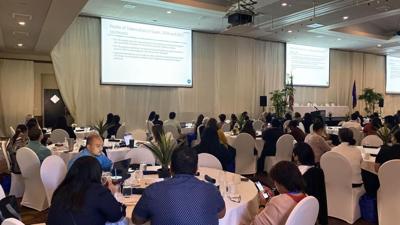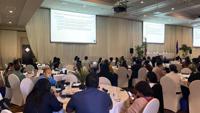The Department of Public Health and Social Services has identified two new multidrug-resistant tuberculosis cases, while a third person on Guam is being treated for a relapse of the disease.
Public Health investigators are looking for people who might have been in close contact with the individuals.
The people involved are complying with isolation precautions, according to a news release from Public Health.
The first new case is linked to a 2021 outbreak of multidrug-resistant TB in the U.S.
The individual, who was resistant to four of the first-line TB treatments, was exposed in the mainland U.S., moved back to Guam, and recently developed TB symptoms.
A subsequent contact investigation yielded one secondary case, a person who was exposed locally.
Epidemiologic investigations to determine possible close contacts have been initiated and are ongoing, according to Public Health.
At the same time, health officials are managing the complex care of another person with multidrug-resistant TB who relapsed after completing bedaquiline, pretomanid and linezolid regimen.
Upon diagnosis, Public Health launched its TB protocol, which focuses on the identification, isolation and treatment of people with the infection.
Household members and social contacts are being evaluated for TB disease and latent TB infection with tuberculin skin test, chest imaging and sputum testing, according to Public Health.
The agency is collaborating with the U.S. Centers for Disease Control and Prevention.
TB is spread through the air by coughing, laughing, singing and sneezing.
The only way to get the disease is by frequent or close contact with someone with active TB disease.
It cannot be spread by touching someone’s clothing, drinking glass, eating utensils, handshake, toilet or other surfaces.
Symptoms of TB can include a cough lasting longer than three weeks, unexplained weight loss, night sweats, chills, fever and coughing up blood.
TB disease is effectively treated with antibiotics for six to nine months. Once treatment begins, a person with TB becomes non-contagious within a few days to weeks and can resume normal activities without posing a risk to others.
Public Health’s TB/Hansen’s Disease Control Program monitors and appropriately treats all known active TB cases on the island.
For more information about TB, visit the CDC’s website at www.cdc.gov.
For questions, call Public Health’s TB/HD Control Program at (671) 788-4033/4098.












(0) comments
Welcome to the discussion.
Log In
Keep it Clean. Please avoid obscene, vulgar, lewd, racist or sexually-oriented language.
PLEASE TURN OFF YOUR CAPS LOCK.
Don't Threaten. Threats of harming another person will not be tolerated.
Be Truthful. Don't knowingly lie about anyone or anything.
Be Nice. No racism, sexism or any sort of -ism that is degrading to another person.
Be Proactive. Use the 'Report' link on each comment to let us know of abusive posts.
Share with Us. We'd love to hear eyewitness accounts, the history behind an article.